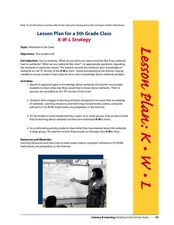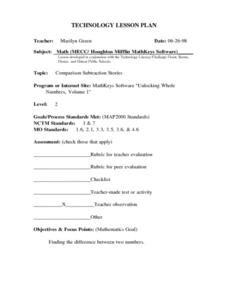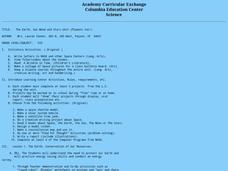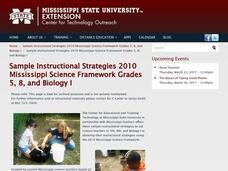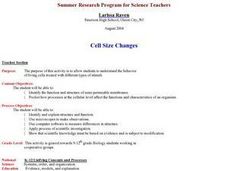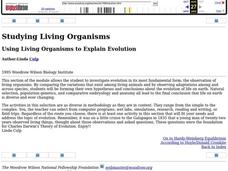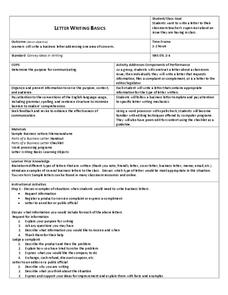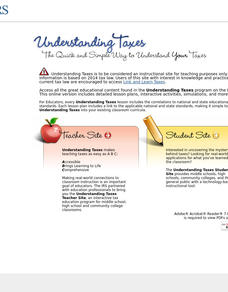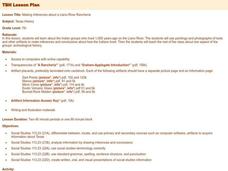Curated OER
Trading in Subtraction
Second graders solve two-digit subtraction problems without trades using counters and by modeling trades with base-ten blocks. They pair in groups and students open the "Counters Open Mat". Students are given a problem, such as: there...
Curated OER
Adding Tens
Second graders explore and discuss adding 10 as they predict number patterns with the hundred chart. They work in pairs, groups choose a number, 1-9, and predict what happens if they add 10 to the number. Students make-a-ten strategy...
Curated OER
Water Microbes and Human Health
Students research the possible sources and human health effects of microbes found in recreational and drinking water. They explore the range of negative outcomes of contact with contaminated recreational and drinking water by creating...
Curated OER
Wetlands in Our State
Fifth graders access prior knowledge to create a KWL about the wetlands. In this wetlands lesson, 5th graders research to answer the questions in their KWL.
Curated OER
Monster Exchange
Students draw and describe their monster. They exchange papers with another student and recreate the monster based on the other student's description.
Curated OER
Straw Breathing Exercise
Students fill out an anonymous questionaire to explore whether they might have asthma. They then set up a spreadsheet to enter the data, decide on a definition of asthma, and figure out the prevalence of asthma. Pupils simulate what it...
Curated OER
Does Your Fitness Compute?
Fourth graders chart and analyze baseline data pertaining to improving and maintaining fitness levels. Personal trainers calculate their clients' charts and write a one-page report on the findings for the evaluation portfolio of each...
Curated OER
What is a Seed?
First graders identify the parts of a seed. In this plant biology lesson, 1st graders are given a seed and identify each part of the seed by using a hand lens. Students plant a seed and graph the growth.
Curated OER
Comparison Subtraction Stories
Second graders create stories that model comparison subtraction while using the environmental mats. They suggest situations in which they compare numbers. For example, if one student has 6 nickels and another child has 14 nickels,...
Ohio Literacy Resource Center
Regions of the United States
Young scholars create a travelogue of a particular U.S geographic region that includes aspects of population, climate, landforms, culture, famous people, and places as well as any natural resources. They present the travelogue to the class.
Curated OER
The Earth, Sun, Moon, And Stars
Fifth graders explore the solar system. In this solar system unit, 5th graders investigate numerous projects while rotating through learning centers. Students write about space and construct a space shuttle model. Students practice map...
Curated OER
Sense of Touch
Students identify their five senses by reading a story. In this human anatomy lesson, students read the book, Here Are My Hands by Bill Martin Jr, and touch a variety of objects. Students describe and record each object they...
Curated OER
Graphing the Past Using Today's Technology
Eighth graders research statistical data regarding their current social studies unit. They write questions about the measures of central tendency, collect and analyze the data, insert the data into a spreadsheet, and generate graphs.
Curated OER
Elders' Weather Forecasting
Learners interview an Elder to determine ways of forecasting the weather. In this weather lesson, students use the information from an interview to make a weather prediction.
Curated OER
Geography: Water, Water Everywhere
Learners discuss flooding and its causes. They view a Powerpoint presentation about floods and prevention methods. After creating a model with clay and pans, they investigate river behavior in various terrains with different amounts of...
Curated OER
Cell Size Changes
Learners examine the behavior of living cells treated with different types of stimuli. They watch an online movie, examine wet mount slides under a microscope, take an online quiz, and analyze data.
Curated OER
Using Living Organisms to Explain Evolution
Students investigate evolution in its most fundamental form: the observation of living organisms. By comparing variations that exist among living animals, students formulate their own hypotheses and conclusions about the evolution of...
Curated OER
Reading Satellite Images
Students analyze satellite images. In this astronomy instructional activity, students examine 3 satellite images in order to understand how satellite images are taken and what they can teach scientists.
Curated OER
Letter Writing Basics
Students write a business letter with information regarding specific writing mechanics. In this writing lesson, students learn to write a business letter and they focus on one area of concern. Students follow a business letter...
Curated OER
The Politics Of Taxation
Students explain that taxation involves a compromise of conflicting goals and that lobbyists can influence lawmakers' decisions about taxes. They can explain why people of similar incomes often pay different tax rates and work in teams...
Curated OER
Making Inferences about a Llano River Rancheria
Seventh graders study the Indian groups who lived 1,000 years ago on the Llano River. They use paintings and photographs of tools and other artifacts to make inferences and conclusions about how the Indians lived.
Curated OER
Modeling Mitosis and Meiosis
Students construct and manipulate models of mitosis and meiosis and compare/contrast them. They create the models using index cards and yarn, interpret diagrams and photographs, and summarize written descriptions.
Curated OER
Through the Lens of Robert Capa
Students use Guided Reading techniques to learn about Capa's style and to discover the techniques that made him a great photographer. Students examine the basics of telling compelling stories through photos and each student creates a...
Curated OER
The Sun and Moon
Students understand basic concepts about Earth, the Sun and the Moon,
such as relative movement and the phases of the moon. Through discussion, looking at pictures, listening to Native American stories, observing, and building models,...





